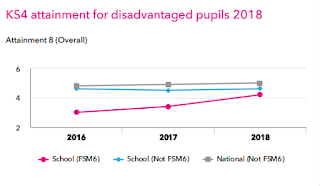On the side of the road that wends
its way from Westbury to West Lavington stands an old milestone in the
village of Edington. Blink and you'll miss it. The black words on the white metal plate read, "LONDON 97 MILES". Handy things, milestones. They mark the progress you have made towards your desired destination.
I reached a personal milestone in
my role as a governor last Tuesday evening when I chaired the meeting of the
Full Governing Board for the final time and handed over the reins to my
colleague, Brian Ralph. We've been co-chairing for a while, but after six years
in the Chair the time had come for me to step down. Brian will now serve as
sole Chair and I wish him all the best.
Matravers has come a long way over
those six years. Our students sport blazers, shirts and ties rather than polo
shirts and sweatshirts. The school site has benefited from substantial
investment. Most notably in terms of the new maths, science and design block.
Student numbers have increased. Attendance is now at least in line with
national average figures. Results have improved massively. Against national
trends the gap between disadvantaged students and others has virtually
disappeared. (See below from the FFT Dashboard). The governors' vision of Matravers being a 'world-class centre of
teaching and learning' is well on the way to being realised.
Both my children attended the
school and I became a parent governor in January 2012. Cue steep learning
curve. I was appointed as Chair in July 2013. Cue an even steeper learning
curve. Dr Riding became our Headteacher in September of that year. The
achievements outlined above are the result of his strong leadership, also the incredible commitment of our talented staff, the hard work of our exceptional students and
the support of their parents.
The Board of Governors played
its part by setting the strategic direction of the school and monitoring
progress towards our goals. Matravers has seen big changes over the last six
years. But the school has maintained its essence, offering a broad
and diverse arts-rich curriculum. The stunning annual performances are testament to that. Not to mention the amazing array of extracurricular clubs and showcase events. As ever, we aim to be highly aspirational, yet
deeply inclusive.
We've been able to safeguard the vibrant ethos and core values of Matravers because of something that didn't happen in my
time as Chair. Unlike many schools we did not care to join a Multi Academy
Trust. In MATs key decisions are made by the trust board, not at the level of the individual academy. We remain a Local Authority Foundation School that is governed by
stakeholders drawn from our own community. If you are passionate about ensuring the young people of the Westbury area have the best possible education, why not consider becoming a governor? See here for info on vacancies.
It's been a privilege to have
served as Chair and then Co-Chair of the board. I plan to continue as a
governor, doing my bit from the 'backbenches'. I pay tribute past and present
members of our 'active, sophisticated and engaged Governing Body' (in the words of an External Review of Governance). Thanks also to our Clerk for keeping us in order.
Just like that milestone in
Edington the end of my time as Chair serves as a little marker that shows how
far Matravers has come in its journey towards being a truly 'world-class'
school at the heart of our region.




